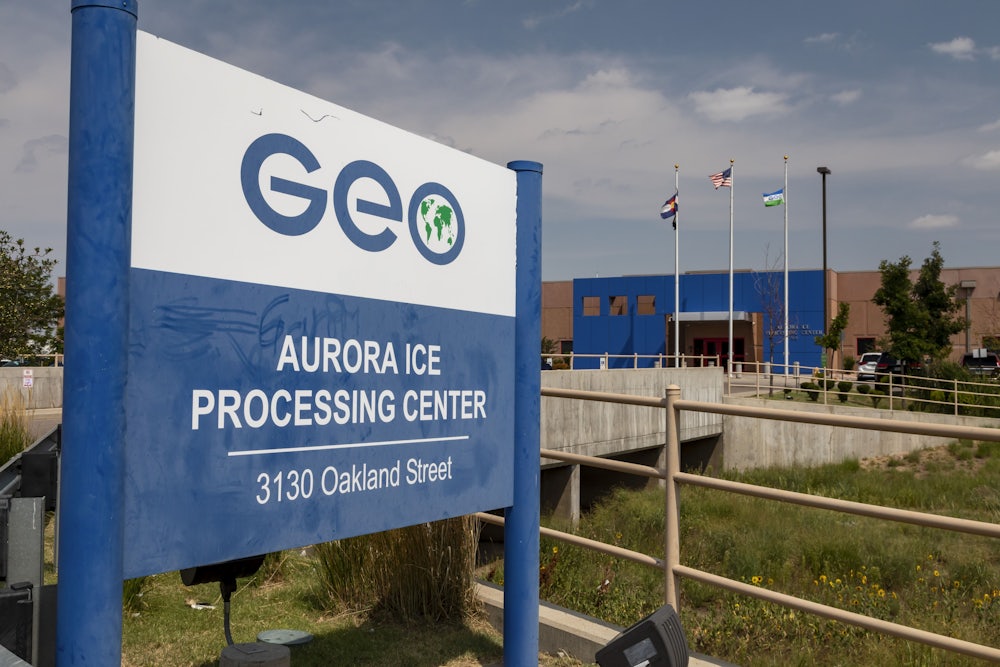At a for-profit immigrant prison in Colorado, prisoners say they were threatened with solitary confinement if they refused to work as unpaid janitors, cleaning common areas of the facility for free. Rather than hiring—and paying—regular employees to do the work, the company allegedly boosted its profits by making the immigrants do it instead.
“We are not slaves. We are detainees. And we should not be forced to clean. That’s wrong,” Alejandro Menocal, an immigrant who was held in the Aurora, Colorado, facility and is now suing the prison company, testified in a deposition.
Across the country, for-profit prison companies are facing similar lawsuits, alleging that they violate the federal law banning forced labor, as well as state minimum-wage laws, by coercing immigrant prisoners to work either for free or for just a dollar a day.
Now the company that runs that Colorado prison, the Geo Group, is asking the Supreme Court for help. It says it needs immunity from lawsuits like Menocal’s. Much as the government enjoys sovereign immunity from some suits, Geo believes it is similarly entitled to immunity as a government contractor.
If the company does not have protection from these lawsuits, Geo argues, opponents of the Trump administration’s immigration policies could wage a “proxy war” against it. Lawsuits against private prison operators could discourage companies from helping Trump carry out his policies, amounting to “judicial gum in the works of democracy,” Geo says.
The Supreme Court will hear oral argument in the case, The Geo Group v. Menocal, on Monday. Lined up against Geo are some unusual allies, including a major public-sector union, the conservative think-tank Cato Institute, the good-government group Citizens for Responsibility and Ethics in Washington—and the Trump administration itself, which argues that private prison companies may deserve immunity but this case isn’t the right way to give it to them.
The Supreme Court’s decision could not only determine whether the immigrant prisoners will ever get their day in court, it could make it harder for anyone to sue government contractors—creating a category of companies that, opponents fear, would be above the law.
The case against the Geo Group stretches back more than a decade, when a group of immigrants who had been locked up at the company’s Aurora facility claimed that Geo’s requirement for them to clean the prison’s common areas—in addition to cleaning their personal spaces, which they didn’t object to—amounted to unlawful forced labor.
Geo is America’s largest private prison operator and the biggest jailer of immigrants for ICE. It operates both traditional prisons, which hold people accused or convicted of crimes, and immigrant prisons, holding people not because they are accused of any crime but because they are waiting for their immigration cases to be resolved. After President Trump’s election, Geo’s stock rocketed up by 65 percent. The company is in line for billions of dollars in new contracts as ICE’s budget balloons under the Trump administration.
ICE pays Geo millions of dollars a year to run the Aurora prison. “But GEO didn’t perform the work itself: It required those detained in its facility to do it,” the immigrant plaintiffs wrote in their Supreme Court filing. “The company forced every person detained at Aurora to perform unpaid janitorial work, sending them to ‘the hole’—solitary confinement—if they refused.”
The plaintiffs say that, inside the prison, immigrants were well aware of Geo’s for-profit status and how they were being used to boost the company’s bottom line. But with the threat of solitary confinement forever looming, they felt they didn’t have much choice but to do the free labor.
“I was scared of going to the hole. Being in detention is already scary, and the hole is so much worse,” Olga Alexakhina, one of those held at the Aurora prison, testified.
Another former prisoner, Hugo Hernandez-Ceren, said that people returning from solitary seemed shattered. “They were really skinny; they had lost a lot of weight. They wouldn’t talk to other people anymore. They seemed afraid. They—they became antisocial,” he said in a deposition.
With the consequences for dissent so severe, prisoners often relented to the guards’ demands that they clean, despite their objections to doing free work for their for-profit jailer. Hernandez-Ceren said he saw one prisoner tell a guard “that he was going to not clean because he was no janitor and that he was not being paid for that type of job and that they had to hire someone to do that.” In response, according to Hernandez-Ceren, the guard took out a bag and said, “Just pack your stuff because you’re going to go to the hole.” That was enough of a threat. The prisoner “started cleaning right away,” Hernandez-Ceren said.
The plaintiffs argue that this violates a federal law that prohibits obtaining a person’s labor by means of force or certain threats of harm. Geo denies it has done anything wrong, and it says it carefully follows the requirements of its contracts with ICE.
The company did not respond to a request for comment.
In addition to requiring prisoners to clean common areas for free, the company also employs prisoners, usually for a dollar a day, to do a variety of other work in its prisons. “We ran the facility—the landscape, the laundry, the kitchen, we washed the floor,” Menocal said in court filings. And while these dollar-a-day jobs were voluntary—prisoners were not sent to solitary if they refused—the litigants argue they were still coerced into doing the work. The food that Geo provided was inadequate, leaving them “chronically hungry,” they say, and giving them no choice but to buy more from the commissary. And to buy food, they needed money. So they worked for whatever Geo would pay them.
“They were using us like slaves. One dollar a day. Unfair. Treating us like dirt,” Menocal said.
These dollar-a-day work programs are widespread and have “subsidized the private prison industry model,” according to Aaron Reichlin-Melnick, a senior fellow at the American Immigration Council. With prisoners working for so little, “they don’t have to have to hire as many people to staff the facility,” he said.
Now, a range of similar lawsuits are pending against Geo and its main competitor in the private prison business, CoreCivic.
In Washington State, immigrants who had worked for a dollar a day in a Geo Group facility sued the company for violating the state’s minimum-wage law. They went to trial and won, with a jury ordering Geo to pay more than $17 million in back pay and a court docking the company another $5.9 million in unjust enrichment. An appeals court upheld the judgment, explaining that because of the dollar-a-day workers, “Geo operated its facility with just a handful of full-time staff hired from the local area, thereby saving millions of dollars that it would otherwise have spent on payroll.”
At the Supreme Court on Monday, the issue is not whether these work programs violate forced labor or minimum-wage laws—in most of the cases, that is still to be decided by lower courts—but instead a narrower legal question that could have wide-ranging implications: What kind of immunity does a contractor like the Geo Group have, and when can Geo raise it in court?
Geo argues that it should be able to assert immunity right away and get out of the lawsuit at the earliest possible moment. It believes that as long as it properly followed the instructions of the federal government, it cannot be sued for its actions.
Geo’s argument rests on the idea of “derivative sovereign immunity.” Sovereign immunity is the rule, dating back to the British monarchy, that the government cannot be sued without its consent. Congress has passed laws that allow for lawsuits against the federal government in some circumstances but not others. Derivative sovereign immunity is similar. The idea is that if the government was legally entitled to pursue some action without the threat of a lawsuit, that immunity should extend to any outside contractor hired to pursue the same action on the government’s behalf.
“While the government’s sovereign immunity prevents those who disagree with federal immigration policy from suing the government directly, contractors like Geo are regularly subject to suits that drive up their costs,” Geo told the Supreme Court.
The lower court denied Geo’s claim of immunity. The company appealed, but the appellate court decided that it was too soon for Geo to raise the immunity issue, saying that it would have to wait until the final resolution of the case to appeal. Now, at the Supreme Court, Geo argues that waiting until then would defeat the point of having immunity in the first place.
Geo’s opponents say that private companies don’t get the government’s immunity from being sued. Instead, they say that if contractors act legally and follow the government’s instructions properly, they can raise that as a defense. The difference between an immunity and a defense is key: An immunity would mean that contractors could avoid lawsuits entirely—if someone sues them, they could get out of it right away—while a defense would usually mean that the contractor, like anyone else, could be sued and would have to go through litigation, possibly including discovery and a trial, before a court would ultimately decide whether its defense would win the day. If the contractor only has a defense rather than immunity, then the plaintiffs could still make their case in court.
Geo’s opponents argue that giving contractors immunity misses the point of immunity in the first place—which, according to Citizens for Responsibility and Ethics in Washington, is to let the government do what it believes is in the public interest without being constantly hauled into court. But a for-profit company acts in its private interest, not in the public interest. Geo’s “drastic expansion of sovereign immunity,” the group wrote in a court filing, is “contrary to the public’s interest in a responsive and efficient government animated solely by the need to serve the American people.”
Even the Trump administration has come out against Geo, although in a more limited way. It argues that contractor immunity should be decided by Congress or a special rulemaking body, not in a court decision.
The outcome of the Supreme Court case will likely affect more than only the forced labor and minimum-wage lawsuits against Geo. One brief in support of the immigrants warned that Geo’s theory would “weaken accountability for violations of individual liberties,” making it harder, if not impossible, for people whose rights were violated by private contractors to hold those companies accountable.
That includes any kind of contractor, not just prison operators. “Insulating private government contractors from liability to those they have harmed will only erode accountability,” a public employee union said in a brief supporting the immigrants. The Supreme Court’s decision in the case is expected by July.










